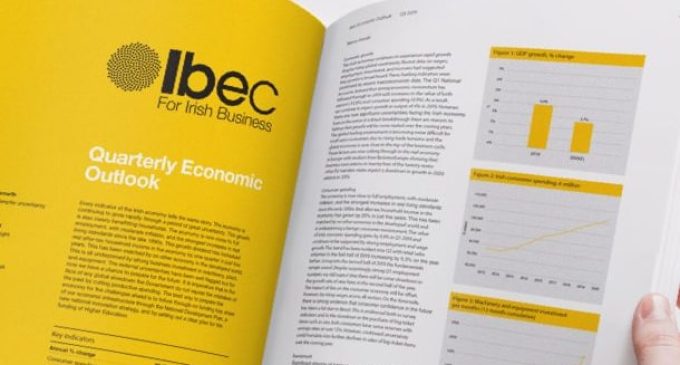Ibec publishes Irish Economic Outlook report for Q2 2023

Ibec, the group that represents Irish business, has published its new Economic Outlook, which forecasts growth in domestic demand of 3.4% in 2023 and 2.3% in 2024. The Outlook says that whilst we are now beyond a period of significant volatility, with global supply chain disruptions, volatile energy prices and inflation now well on the path to more normal levels, there is also an increasing sense that we may be entering a period of more moderate growth globally.
Commenting on the report, Ibec Chief Economist, Gerard Brady, said: “Over the past 18-months the global economy has been boosted by bounce back demand as we recovered from Covid and ongoing significant levels of fiscal support from Governments. As demand normalises, fiscal support is withdrawn and we begin to experience the lagged impact of rapid interest rate hikes we expect to see a moderation of global demand, particularly in some major trading partners.”
“The global economy has proven resilient to high inflation and consequently higher interest rates thus far. This is in line with our expectations in our Q1 Economic Outlook that the ingredients were in place for stronger than expected growth in the US and that a prolonged recession in Europe was unlikely. However, there are still some concerns about growth slowing significantly in some major trading partners. Whilst the US economic performance looks very robust, major trading partners such as the UK, Germany and China are of greater concern. All have material economic vulnerabilities due to rising interest rates and weak demand which may persist through 2023 and 2024.”
“A moderation in growth is not unexpected given the ongoing withdrawal of record fiscal support and the lagged impact from the fastest increase in interest rates since the 1970s. For the Irish economy, our recent outperformance is unlikely to continue indefinitely. It is our view that over the coming 18 months we will begin to see some moderation in the rate of growth in the economy. We expect the domestic economy to grow by 3.4% in 2023, in line with previous expectations. However, for 2024 we now expect growth of around 2.3%, resulting from a slowdown following a period of record investment, softer employment growth and consumer spending growth dented by the lagged impact of higher interest rates.”
“In this context it remains important the resources available to us, in the form of large Government surpluses which we have today, are used wisely by storing up today’s surpluses in a National Infrastructure Fund and building the capacity, beginning in October’s Budget, to deploy them over the course of the next decade. During these periods, it is also crucial to be cognisant of our vulnerabilities. Already costs are a more prominent concern for businesses than in recent years. It is important that we do not build top-of-cycle assumptions into either Government or business decision.”


























